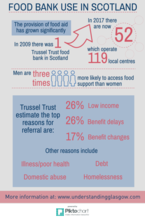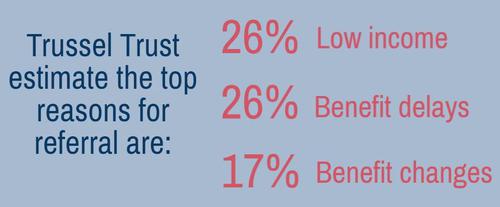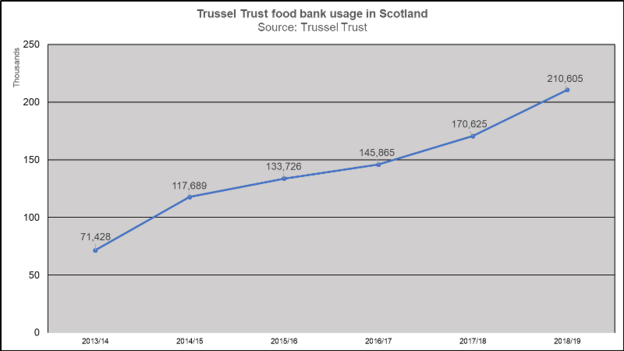Food Banks

Click on our infographic to see the key facts from this indicator set.
The provision of food parcels and food aid has grown significantly in Scotland and the rest of the UK in the last ten years. In 2009, there was one Trussell Trust foodbank operating in Scotland. By April 2017, this had increased to 52, with 119 centres - some operate ‘satellite’ foodbank centres in various locations in the surrounding area.
Across the UK, as of April 2019, there are now over 1,200 Trussell Trust food bank centres, and the Independent Food Aid Networks show that there are at least 805 further independent food banks.
In 2011, the Trussell Trust provided 5,726 three-day emergency food supplies to people in Scotland. By 2018/19 this had risen to 210,605. Of these, 141,195 were given to adults and 69,410 were given to children.
The Food Aid Network recorded a total of 480,583 emergency food supplies given out by both independent and Trussell Trust food banks between April 2017 and September 2018. Volunteers worked in food banks for 4,117,798 unpaid hours in 2017, contributing at least £30,883,482 across the UK.
This map, developed by Urban Roots, shows food banks and hot meals available across Glasgow. It currently has 109 entries (as of September 2019), which can be filtered by date or type, and there may be more informal food aid going on in the city.

Who is using food banks?
Citizens advice bureaux work with local providers of food to ensure that clients in need are signposted to local sources of support. Men are more likely to be given this type of support: around 3% of male clients seek advice compared to 1% of female clients. As well as this, 8% of all unemployed clients, 4% of those unable to work due to a disability and 6% of those who live in council rented accommodation have sought advice on food aid - see citizens advice bureaux report. In Glasgow destitute migrants also use both foodbanks and soup kitchens. They tend to be homeless or threatened with homelessness and mainly comprise asylum seekers whose application for asylum has been rejected.
Reasons for using food banks
The introduction of Universal Credit has been thought to have had an impact in foodbank use – in 2016 the Trussell Trust reported that in areas of full Universal Credit rollout across the UK, their foodbanks had seen a 17% increase in demand, compared to a 7% increase nationally. Universal Credit is being introduced as a replacement for six means tested benefits: income support, jobseekers allowance (JSA), employment and support allowance (ESA), working tax credit, child tax credit, and housing benefit. There are several key differences to Universal Credit, including that there is a six week delay before the first payment; it is paid in arrears; and that it introduces new forms of conditionality for both out of work and in work claimants. As of April 2017 it had been introduced in four local authorities in Scotland, with full rollout planned by September 2018. Glasgow City will be the last local authority in Scotland to transition to Universal Credit.
In 2017, the Trussell Trust reported that the most given reason for using foodbanks was low income (26%), followed by benefit delays (26%) and benefit changes (17%). Even where the target time for processing a claim is met, the gap between need and payment can be a long time to cope without income.

Evidence from citizens advice bureaux and the Trussell Trust can give some insight into foodbank use due to benefit reform and administration. For example, the proportion of clients who used a Trussell Trust foodbank due to a benefit change increased from 10% in 2011/12 to 19% between April-September 2013. More than four in ten (43%) clients who received help during April-June 2012 were referred to Trussell Trust foodbanks due to problems with benefits; this had risen to 52% during April-June 2013 when welfare reforms such as the spare bedroom subsidy (commonly known as the bedroom tax) came into life.
In particular, the sanctions regime for Jobseekers Allowance (JSA) and Employment Support Allowance (ESA) claimants has been a factor in the rise in food bank use. JSA claimants are required to meet a number of conditions in order to show that they are actively seeking employment. A failure to meet these conditions may result in the claimant’s JSA payments being sanctioned for a fixed period of up to three years. Claimants can receive sanctions for a number of reasons, including failure to apply for or accept a job, failure to attend a mandatory Jobcentre meeting, or failure to participate in the Work Programme.
A Parliamentary Committee looked into the issue of food banks in 2014 to find out if there were possible links to the UK Government’s welfare reforms. In June 2014, they published a report of their findings, Food Banks and Welfare Reform, which stated that although the Department of Work and Pension’s Ministers made it clear that ‘they see no direct link between the increase in use of food banks in Scotland and welfare reform’, the Committee was ‘convinced by the volume and strength of the evidence it has received that there is a direct correlation between welfare reform and the increase in use of food banks’.
More information
The information above is taken from the following reports:
- Dignity: Ending Hunger Together in Scotland - The Report of the Independent Working Group on Food Poverty (Scottish Government)
- Early Warnings: Universal Credit and Foodbanks (Trussell Trust)
- Food Banks and Welfare Reform (Scottish Parliament)
- Overview of Food Aid Provision in Scotland (Scottish Government Faith in the Community)
- Voices from the Frontline: Food parcels and the benefits system (Citizens Advice Bureau)
- Parliamentary Committee Submission from the Trussell Trust (Trussell Trust)
Data on the Trussell Trust is taken from the Trussell Trust website. The Trussell Trust statistics are a measure of volume – they show the number of people to whom The Trussell Trust foodbanks have given three days’ emergency food. These are not necessarily unique users. For example, if a family of three was referred to a foodbank twice in one year, this would count as six people on the system, because someone received three days’ emergency food six times. However, if a family of three were only referred to a foodbank once, this would count as three.
Access more information about the Citizens Advice Bureau.
Additional information on food banks in Glasgow can be found on the Glasgow Advisory and Information Network.
This short documentary film (YouTube, opens in new window) looks at the volunteers and users of the Maryhill Foodbank in Glasgow.
Additional Resources
-
ResourceWednesday, 2 June 2010
SIMD Analysis: Future Projections
An analysis of the reasons behind the recent decline of deprivation in Glasgow, with tend projections towards 2015. -
ResourceSunday, 1 November 2009
Miniature Glasgow - Video
An extension of the GCPH's work profiling Glasgow's health, produced in collaboration with the International Future Forum.







